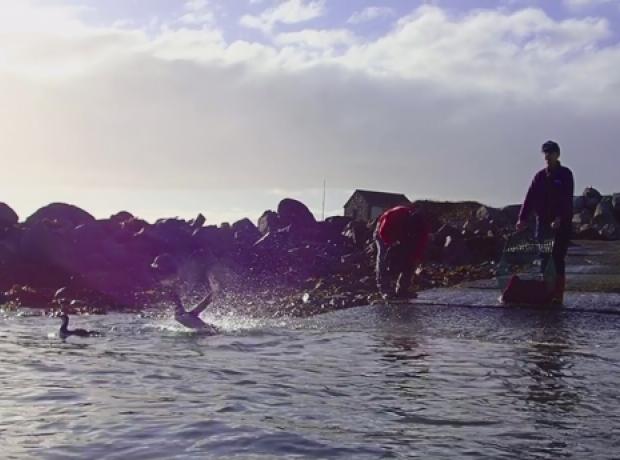Links to vets in Guernsey
Local useful links
Website donated by:

You may remember before Christmas the GSPCA were helping and rescuing oiled birds from around Guernsey and three featured on ITV Channel News.
The great news is last week on the 9th January they were released back to the wild.
Steve Byrne GSPCA Manager said “We have named the three oiled guillemots Gallileo who were from Ladies Bay, Guillbert from Le Picquerelle and Guilly was rescued from Petit Bot.”
“Yvonne and Beckie took the three birds last week up to the slip way near Rousse Tower along with Channel ITV to film their release.”
“We strive to get each of the 2000+ wild animals we help a year back to the wild but it is never easy when they are oiled as they are often so poorly.”
“Sadly when we see severe stormy weather oil can be stirred up which is what we think has happened and with possible rough weather ahead we could see more.”
“If you see an oiled bird please call us immediately as if you try to chase and catch it they will often try and make it back out to sea.”
“We have our GSPCA emergency helpline via 01481 257261 which is answered 24/7 and also helpful advice online for anyone that finds an oiled bird.”
“We are currently appealing to raise funds for our new Wildlife Hospital which you can do so via https://giving.gg/donate/event/4618/Please-Support-the-GSPCA-Wildlife-Hospital-Appeal and to help us buy a new intensive care unit please visit https://giving.gg/donate/event/4619/Please-Support-the-GSPCA-Wildlife-Hospital-Build-Appeal .”
“You can also Buy a Brick in the new build and to sign up and get involved please visit http://www.gspca.org.gg/blog/gspca-launch-buy-brick-proposed-new-wildlife-hospital or to make a donation to help Ger you can visit https://giving.gg/donate/charity/2/Guernsey-Society-for-the-Prevention-of-Cruelty-to-Animals-(GSPCA) .”
Yvonne Chauvel Senior Animal Care Assistant said “What a truly lovely time we had releasing the guillemots back to where they belong.”
“It was lovely to have ITV Channel with us who filmed the release.”
“They went so well and we rung them before they left.”
“This has really helped as we often find out that many of the birds we release live for many years and do very well although Guilly was found at the side of the road on Thursday and is back in our care although there isn’t much wrong with him so hopefully will get him back to the wild soon.”
Beckie Bailey GSPCA Animal Care Assistant who is looking after the birds said “I had the most wonderful time releasing the 3 guillemots back to the wild.”
“If you come across an oiled bird please contact the GSPCA on the emergency line 07781 104082 or bring it up to the Shelter.”
“We are a 24 hours service so please do not hesitate to contact us.”
“Many people don't realise, however, is that even a small amount of oil, no more than a penny-sized drop, can be deadly to birds.”
“Understanding how oil affects birds can raise awareness of just how hazardous any oil spill or similar pollution can be.”
“The most obvious way oil affects birds is by coating their plumage in sticky, greasy slime.”
“Birds' feathers are precisely aligned and designed to provide superb waterproofing and insulation.”
“Oil in the feathers, however, will mat them and misalign the tiny barbs that keep the feathers properly positioned.”
“Even a small misalignment can cause birds to lose critical body heat, therefore exposing them to temperatures and weather conditions that can be fatal.”
“Oiled birds also lose their natural buoyancy from air pockets created by proper feather alignment, and they can sink and drown in polluted waters.”
“In order to remove the oil from their feathers, oiled birds will begin to preen excessively, even desperately.“
“As they preen, they inadvertently ingest the toxic sludge, which will then poison their kidneys, liver, lungs, intestines, and other internal organs, causing slow and agonising death.“
“If they do not die from the oil's toxicity, their excessive preening in a desperate attempt to realign their feathers and get clean again will cost them more energy than they can spare.
“Many oiled birds eventually succumb to exhaustion, dehydration, or starvation.”
Here is some simple advice on what to do if you find sea life affected by any oiled substance -
Do not risk your safety by looking for or picking up birds from dangerous locations. Be aware of the tides and weather conditions.
If you do find an oiled bird and it is safe to pick it up, ensure that you are wearing gloves because the oil could be hazardous to your health. The birds may also try to peck you, so keep them away from your face.
Collected birds should be placed on their own in cardboard boxes with newspaper or a towel. DO NOT use hay or straw. The boxes should have ventilation holes.
Call the GSPCA 24 hour help line on 01481 257261 or take the bird directly to the Animal Shelter in St Andrews
Please do not attempt to wash or feed the bird yourself - leave that to the Shelter staff and volunteers who have the correct training and facilities.
The GSPCA receives dozens of birds every year due to a variety of oiled substances but this simple advice can help save those birds in need.
Help us help animals this decade. From donating to Sponsoring a Pen, Buying a Brick for the much needed Wildlife Hospital to our Amazon and main page Wish List, holding a mufti day to a sponsored Christmas dip, here are some of the ways you could help give animals joy this year.
For lots more ideas on how you can support the shelter and the animals in our care then please visit our fundraising page www.gspca.org.gg/fundraising
To see a list of our volunteer induction evenings which we hold each month and for more information please visit http://gspca.org.gg/about/volunteers or call 257261
To find out more on trips, talks and our education work please email education@gspca.org.gg or call 01481 257261



Post new comment